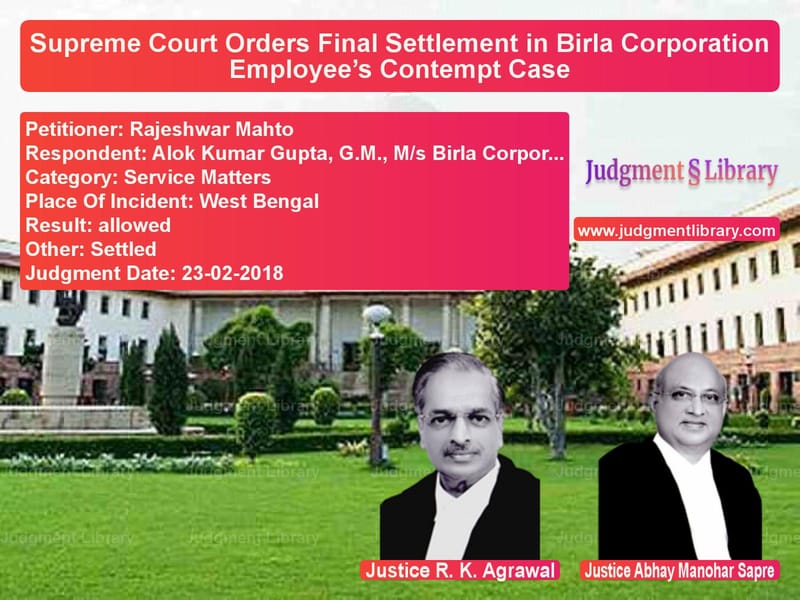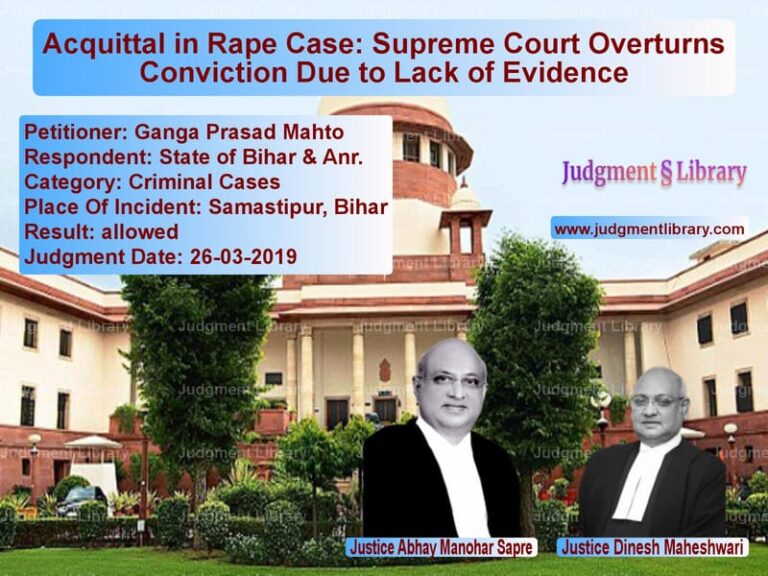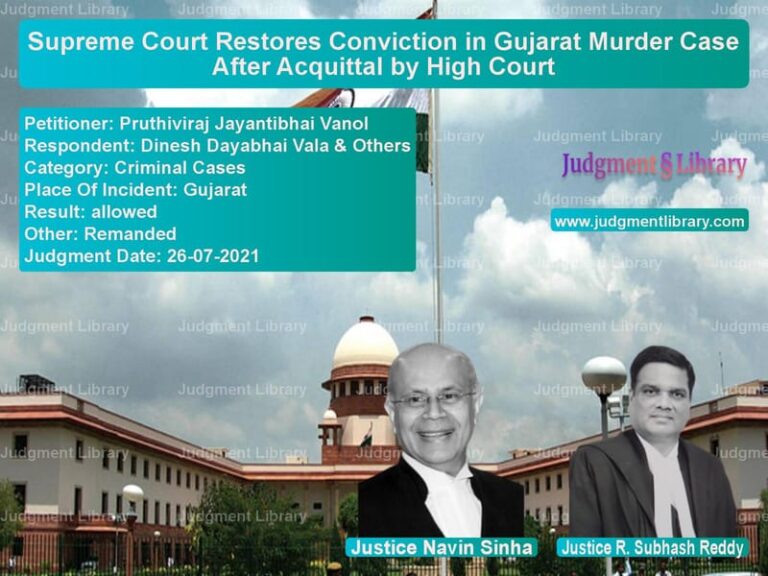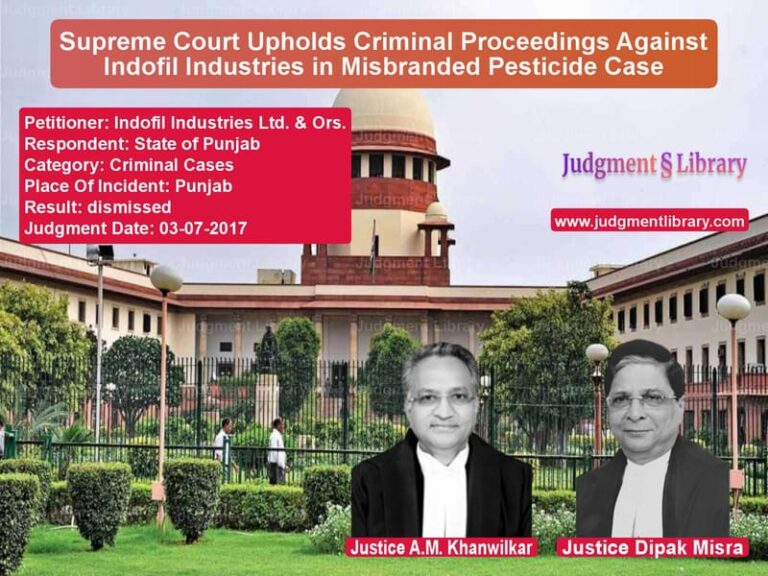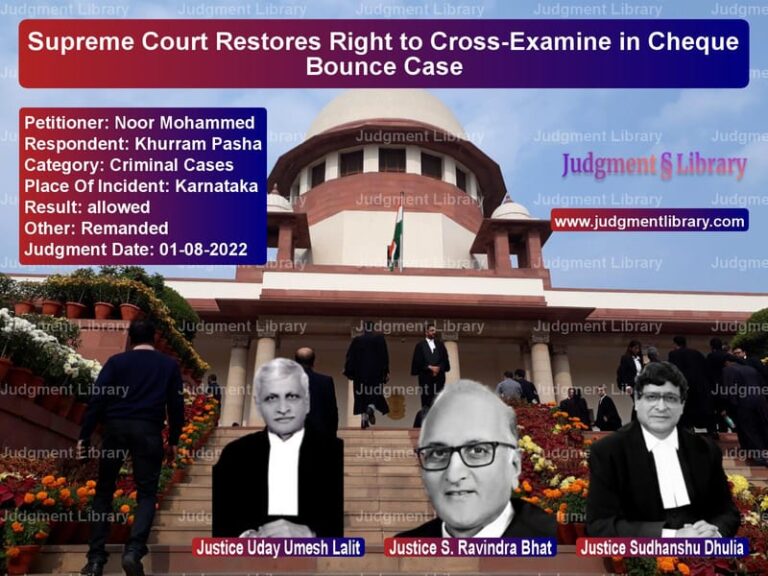Supreme Court Orders Final Settlement in Birla Corporation Employee’s Contempt Case
The Supreme Court of India recently ruled in Rajeshwar Mahto vs. Alok Kumar Gupta, G.M., M/s Birla Corporation Ltd., addressing the long-standing employment dispute of an employee against his employer. The Court examined whether the employer had complied with an earlier interim order regarding back wages under Section 17-B of the Industrial Disputes Act, 1947, despite the final ruling favoring the employer. In its verdict, the Court directed the employer to pay Rs. 7,50,000 as a full and final settlement to the employee.
Background of the Case
Rajeshwar Mahto was employed by M/s Birla Corporation Ltd. on December 4, 1974. However, on September 1, 1985, the company terminated his services. At the time of termination, Mahto’s last drawn salary was Rs. 1,185 per month. Claiming wrongful dismissal, he raised an industrial dispute before the Industrial Tribunal.
The Tribunal, in its award dated November 22, 1991, ruled against Mahto, stating that he was not a ‘workman’ as defined under Section 2(s) of the Industrial Disputes Act, 1947. Consequently, the Tribunal held that the reference made by the government was not maintainable.
Legal Proceedings
High Court Rulings
Unhappy with the Tribunal’s decision, Mahto approached the Calcutta High Court through a writ petition. On March 22, 1996, a Single Judge Bench ruled in his favor, setting aside the Tribunal’s order and holding that Mahto was a ‘workman.’ This decision was later upheld by the Division Bench of the High Court on March 31, 1998.
Appeal Before the Supreme Court
M/s Birla Corporation Ltd. challenged the High Court’s decision before the Supreme Court in Civil Appeal No. 4482 of 1998. During the pendency of the appeal, the Supreme Court passed an interim order on May 4, 1999, directing the employer to pay Mahto the full wages last drawn by him from May 1, 1998, onwards, subject to an affidavit confirming that he was not gainfully employed elsewhere.
However, on October 31, 2000, the Supreme Court ruled in favor of Birla Corporation Ltd., setting aside the High Court’s decision and upholding the Tribunal’s ruling that Mahto was not a ‘workman.’ As a result, his dismissal was deemed lawful.
Contempt Petition for Non-Compliance
Despite the final ruling, Mahto filed a contempt petition in the Supreme Court, alleging that the employer had failed to comply with the May 4, 1999 interim order regarding back wages under Section 17-B of the Industrial Disputes Act. He contended that the employer had not paid the arrears owed to him during the pendency of the appeal.
Employer’s Defense
The employer argued that:
- They had offered an amount to Mahto, but he refused to accept it, claiming it was insufficient.
- The Supreme Court’s final ruling in 2000 negated any obligations from the interim order.
- They were willing to settle the dispute by making a reasonable payment.
Supreme Court’s Judgment
The Supreme Court examined the matter extensively and clarified the principle of compliance with interim orders under Section 17-B of the Industrial Disputes Act.
Upholding Section 17-B Compliance
The Court emphasized that an interim order granting back wages under Section 17-B remains valid and enforceable even if the final judgment favors the employer. It cited Dena Bank vs. Kiritikumar T. Patel (1999) 2 SCC 106 and Dena Bank vs. Ghanshyam (2001) 5 SCC 169, reiterating:
“The payment under Section 17-B is in the nature of subsistence allowance, which is not recoverable even if the final award is set aside.”
Final Settlement Amount
After considering the delay, the employer’s offer, and the time spent in litigation, the Supreme Court ruled that Mahto should be compensated with Rs. 7,50,000 in full and final settlement. It directed:
“The Corporation shall pay a total sum of Rs. 7,50,000 to the applicant towards all claims arising out of his employment dispute in full and final settlement.”
Vacating Company-Provided Accommodation
The Court noted that Mahto was still occupying a company-provided quarter. It ordered:
“The applicant shall vacate the company quarter within three months, and upon doing so, the employer shall make the payment within one week.”
Key Takeaways from the Judgment
- Section 17-B of the Industrial Disputes Act is Binding: Even if an employer wins the final case, they must still comply with interim orders passed under Section 17-B.
- Compensation for Legal Delays: The Court ensured a fair monetary settlement considering the prolonged litigation.
- Employee’s Rights Upheld: The judgment protects employees from financial hardship caused by prolonged disputes.
- Enforcement of Interim Orders: Employers cannot evade payment obligations arising from interim relief.
Conclusion
The Supreme Court’s judgment in Rajeshwar Mahto vs. Birla Corporation Ltd. reinforces the binding nature of interim relief under labor laws, even when final rulings favor the employer. The decision ensures that workers are not left financially stranded during protracted litigation. By directing a final settlement and mandating compliance with past orders, the ruling balances fairness and legal certainty in employer-employee disputes.
Petitioner Name: Rajeshwar MahtoRespondent Name: Alok Kumar Gupta, G.M., M/s Birla Corporation Ltd.Judgment By: Justice R. K. Agrawal, Justice Abhay Manohar SapreJudgment Date: 23-02-2018
Don’t miss out on the full details! Download the complete judgment in PDF format below and gain valuable insights instantly!
Download Judgment: Rajeshwar Mahto vs Alok Kumar Gupta, G. Supreme Court of India Judgment Dated 23-02-2018.pdf
Direct Downlaod Judgment: Direct downlaod this Judgment
See all petitions in Employment Disputes
See all petitions in Termination Cases
See all petitions in Public Sector Employees
See all petitions in Judgment by R K Agrawal
See all petitions in Judgment by Abhay Manohar Sapre
See all petitions in allowed
See all petitions in settled
See all petitions in supreme court of India judgments February 2018
See all petitions in 2018 judgments
See all posts in Service Matters Category
See all allowed petitions in Service Matters Category
See all Dismissed petitions in Service Matters Category
See all partially allowed petitions in Service Matters Category

